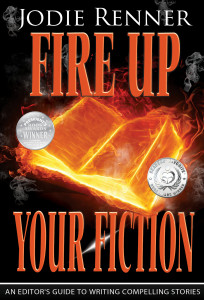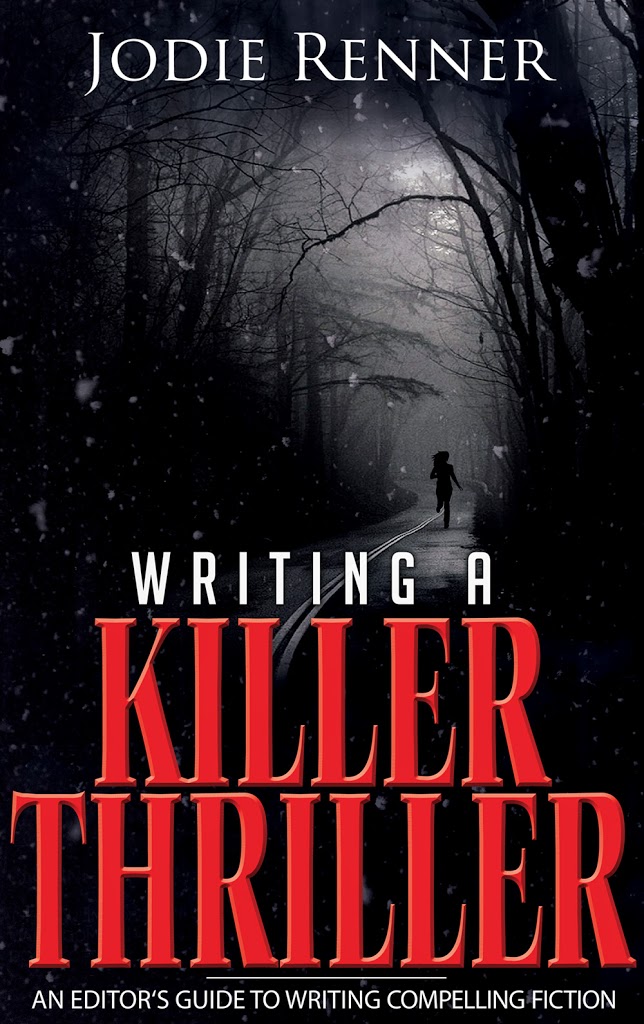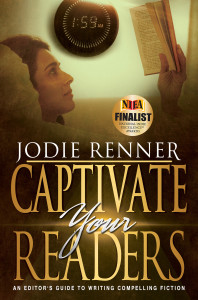 by Jodie Renner, freelance fiction editor & craft-of-writing author
by Jodie Renner, freelance fiction editor & craft-of-writing author
If you’re relatively new at writing fiction for publication, whether you plan to publish your novel yourself or query agents, it’s a good idea (essential, really) to get your manuscript edited by a respected freelance fiction editor, preferably one who reads and edits your genre. Can’t afford it, you say? I say you can’t afford not to, but below you’ll find lots of advice for significantly reducing your editing costs, with additional links at the end to concrete tips for approaching the revision process and for reducing your word count without losing any of the good stuff.
Editing fees vary hugely, depending on the length and quality of the manuscript, and how much work is needed to take it from “so-so” or “pretty good” to a real page-turner that sells and garners great reviews. Before approaching an editor, hone your skills and make sure your story is as tight and compelling as you can make it – and that it’s under 100,000 words long. 70-90K is generally preferred for today’s fiction.
Don’t be in a hurry to publish your book before it’s ready.
If you rush to publish an early draft, you could do your reputation as a writer a lot of damage. Once the book is out there and getting negative reviews, the bad publicity could sink your career before it has had a chance to take off. It’s important to open your mind to the very real possibility probability that your story could use clarification, revising, and amping up on several levels, areas that haven’t occurred to you because you’re too close to the story or are simply unaware of key techniques that bring fiction to life.
First, write freely, then step back, hone your skills, and evaluate.
First, get your ideas down as quickly as you can, with no editing – write with wild abandon and let your muse flow freely. But once you’ve gotten your story down, or as far as your initial surge of creativity will take you for now, it’s a good time to put it aside for a week or three and bone up on some current, well-respected craft advice, with your story in the back of your mind. Then you can re-attack your novel with knowledge and inspiration, and address any possible issues you weren’t aware of that could be considered amateurish, confusing, heavy-handed, or boring to today’s sophisticated, savvy readers.
 Now’s the time to read a few books by the writing “gurus” (here’s an excellent list), and some of the great craft-of-writing posts by The Kill Zone’s contributors in the TKZ Library (in the sidebar on the right), and maybe join a critique group (in-person or online) and/or attend some writing workshops.
Now’s the time to read a few books by the writing “gurus” (here’s an excellent list), and some of the great craft-of-writing posts by The Kill Zone’s contributors in the TKZ Library (in the sidebar on the right), and maybe join a critique group (in-person or online) and/or attend some writing workshops.
Then, notes in hand, roll up your sleeves and start revising, based on what you’ve learned. If you then send your improved story, rather than your first or second draft, to a freelance editor, they will be able to concentrate on more advanced fine-tuning instead of just flagging basic weaknesses and issues, and will take your manuscript up several more levels. Not only that, you’ll “get” the editor’s suggestions, so the whole process will go a lot smoother and be more enjoyable and beneficial.
A great book to start with is my short, sweet, to-the-point editor’s guide to writing compelling stories, Fire up Your Fiction. And for more on point of view, avoiding author intrusions, and showing instead of telling, peruse Captivate Your Readers. And if you’re writing a thriller or other fast-paced story, check out my Writing a Killer Thriller for more great tips. All three are available in print or e-book, which you can also read on your computer, tablet, or smartphone.
And when it comes time to find a freelance editor, don’t shop for the cheapest one and insist that your manuscript only needs a quick final proofread or light edit. That approach will result in a cursory, superficial, even substandard job, like painting a house that’s falling over and needs rebuilding, and will actually end up costing you more money in the long run. Why?
Because you could well be unaware of how many structural, content, and stylistic weaknesses your story may contain, which should be addressed and fixed before the final copyedit stage. Paying for a basic copyedit and proofread on a long, weak manuscript, only to find out later it needs a major overhaul, which will then require rewriting and another copyedit, is short-sighted — and money down the drain.
Say, for example, your novel is a rambling 130,000 words long. It’s very likely you need to learn to focus your story, cut down on descriptions and explanations, eliminate or combine some characters, maybe delete a sub-plot or two, plug some plot holes, fix point-of-view issues, and turn those long, meandering sentences and paragraphs into lean, mean, to-the-point writing. Not only will this make your story much stronger and more captivating, but it will save you a bundle on editing costs, since freelance editors charge by the word, the page, or the hour, and editing your 80,000-word, tighter, self-edited and revised book will cost you a whole lot less than asking them to slug through 130,000 words written in rambling, convoluted sentences.
Your story may even need a structural or developmental edit.
If you’re at the stage where you know it’s not great but you’re too close to your story to pinpoint the weaknesses, perhaps you should hire a developmental editor to stand back and take a look at the big picture for you and give you a professional assessment of your manuscript’s strengths and weaknesses. Or if you can’t afford a developmental editor, try a critique group or beta readers – smart acquaintances who read a lot in your genre – to give you some advice on your story line and characters, and flag any spots where the story lags or is confusing or illogical.
Enlist help to ferret out inconsistencies and inaccuracies.
You don’t want to lose reader trust and invite bad reviews by being careless about facts and time sequences, etc., either. Find an astute friend or two with an inquiring mind and an eye for detail and ask them to read your story purely for logistics. Do all the details make sense? How about the time sequences? Character motivations? Accuracy of information? For technical info, maybe try to find an expert or two in the field, and rather than asking them to plow through your whole novel, just send them the sections that are relevant to their area of expertise.
It’s even possible that you’ve based your whole story premise on something that doesn’t actually make sense or is just too far-fetched, and the sooner you find that out the better!
Read it aloud.
Read your whole story out loud to check for a natural, easy flow of ideas, in the characters’ vernacular and voice, and suit the tone, mood, and situation. This should also help you cut down on wordiness, which is your enemy, as it could put your readers to sleep.
The more you’re aware and the more advance work you do, the less you’ll pay for editing.
So, to save money and increase your sales and royalties, after writing your first draft, it’s critical to hone your skills and revise your manuscript before sending it out. Also, be sure to find an editor who specializes in fiction and edits your genre, and get them to send you a sample edit of at least four pages. (See my article, “Looking for an editor? Check them out very carefully!”)
And don’t seek out the cheapest editor you can find, as they may be just starting out and unaware of important fiction-writing issues that should be addressed, like point of view and showing instead of telling, etc. And whatever you do, don’t tie the editor’s hands by insisting your manuscript only needs a light edit, because that’s cheaper. You could well end up paying for that “cheap” light edit on an overlong, weak manuscript, then discovering that the story has big issues that need to be addressed and requires major revisions, including slashing and rewriting. Then you’ll have to pay for another complete edit of the new version! $$ multiplied!
Check out these other articles by Jodie for lots of concrete tips on revising and tightening your novel (Click on the titles below):
 Jodie Renner is a freelance fiction editor and the award-winning author of three craft-of-writing guides in her series An Editor’s Guide to Writing Compelling Fiction: Captivate Your Readers, Fire up Your Fiction, and Writing a Killer Thriller. She has also published two clickable time-saving e-resources to date: Quick Clicks: Spelling List and Quick Clicks: Word Usage. You can find Jodie at www.JodieRenner.com, www.JodieRennerEditing.com, her blog, http://jodierennerediting.blogspot.com/, and on Facebook, Twitter, and Google+.
Jodie Renner is a freelance fiction editor and the award-winning author of three craft-of-writing guides in her series An Editor’s Guide to Writing Compelling Fiction: Captivate Your Readers, Fire up Your Fiction, and Writing a Killer Thriller. She has also published two clickable time-saving e-resources to date: Quick Clicks: Spelling List and Quick Clicks: Word Usage. You can find Jodie at www.JodieRenner.com, www.JodieRennerEditing.com, her blog, http://jodierennerediting.blogspot.com/, and on Facebook, Twitter, and Google+.

Great post Jodie. You can’t hammer this point home enough. And it’s helpful to understand what KIND of editor a writer needs. I just sent a friend of mine to your post…he needs more help than I can give him.
So true, Kris. Unfortunately, a lot of new writers don’t realize what they don’t know, and have no idea that their story could probably use a developmental edit for big-picture issues, or at least a thorough content edit, not just a final proofread for grammar and spelling!
Thank you so much for this post. I always look forward to your helpful editing posts, because I feel like I can use your advice immediately.
I am planning on self publishing a serial on Amazon and other platforms. I’m still in the drafting stage, but I’m starting to do a bit of research into the editing/cover art area. Do you have a list of recommended editors? I would ask you, but it’s dark urban fantasy, so a bit out of your genre.
Something else I’ve wondered…is there anything you would do differently during the editing process for a serial? I have a great revision system in place, but was wondering if there were any special considerations for a serial format.
Thanks for your kind words, Elizabeth. TKZ lists a few editors in our “Indie Publishing Resources” in the sidebar. The best list I know of is Elizabeth Craig’s e-book services directory, at http://mysterywritingismurder.blogspot.ca/p/ebook-services-directory.html. Lots of editors there to choose from!
I haven’t edited a lot of serials, but I know there’s good info out there on it. Just try googling it. Good luck with your fantasies! 🙂
Thanks Jodie – I have to confess to still being a bit leery only because some writer friends have had mixed success with freelance editors. Some have been great – some not so good. I think writers just have to do their homework and find the right editor for them:)
Yes, Clare, writers have to read the editors’ websites carefully, including their testimonials, and contact the authors who’ve given them the reviews. (My testimonials got copied and pasted on another website and passed off as their own, so be vigilant!)
Also, be sure they read and edit your genre, and get at least 4-5 pages edited as a sample – 10 or 15 would be much better. Or just pay for an edit of the first 10, 20, 30, 40, or 50 pages, as a trial run, a few “dates” before deciding whether to trust that editor with your whole manuscript.
Great post Jodie. Editors are a must at whatever stage of their career an author is at. Writing as a business requires investment and a good editor is worth their weight in gold 🙂
I couldn’t agree more, AD! 🙂
Jodie, you speaketh wisdom. I used your book Fire Up Your Fiction and Rayne Hall’s Word Loss Diet to edit my manuscript before I paid for an edit. This was about 8 or 9 drafts in. The YA novel went from 65k words to just over 61k. I saved money by doing so much of the frivolous work first before paying hard-earned money for someone to tell me to cut the fluff. Thanks for your excellent craft books!
You have an excellent attitude and approach, Julie! And in the process of doing the pre-edits revisions, you’re learning the craft as well.
And thanks for the tip about Rayne Hall’s Word Loss Diet book – what a creative title! I must check out the book! 🙂
Wow. Lots if great info here… And I thought I had my editing act straight.
Thanks, Eduardo. Glad you found this article useful.
Good stuff Jodie, thank you. I;m writing a fantasy novella and have no idea how find a good editor. Can you help? Will you do it? Anyone? I have three chapters posted on wordpress. just under 2,000 words. But I write prolifically, and have no problem flowing. I’m a newbie because I recently retired from an intense industry. I had little time before now. But all reviews are glowing so far.
Any real help would be deeply appreciated.
The story is titled Blue Stone Standing.
I’ve provided a great link to editors above. Also, if you send me the first 10 pages or so and a brief synopsis of about half a page, I might be able to offer some advice prior to searching out an editor. You can reach me at Info@JodieRennerEditing.com.
Heading into yet another draft of my WIP, with my agent chomping at the bit to have it by summer’s end, I read this with eager eyes to cut back on the fluff & stuff prior to getting ready for the jump.
1. Multiple drafts- Check
2. Reference works like Writing a Killer Thriller – Check
3. Beta readers lined up – check
4. Berthold and Gnillii and the Muses offering advice – Check
I must ensure that Berthold and Gnillii keep the pints at a minimum until after our editing session….Leprechaun’s get waaaaay too creative after more than 2 pints.
Sounds like you’re well on your way, Basil! And keep those leprechauns focused for the editing stage! LOL
I think AD’s comment says it all – a good editor is essential and invaluable.
I found Jodie via Joe Moore here on TKZ.
It’s good to be lucky!
Thanks, Tom. I loved editing your riveting medical thriller, Nerve Damage. Can’t wait for it to come out, really soon! 🙂
Unfortunately, some newbies totally don’t understand the need for an editor. I met one the other day. She’d found a local editor who “no longer wanted to work with me.” This writer had no clue that freelance editors known to more experienced authors existed out there or why it might be in her best interests to hire one. She planned to stick her book up on Kindle and didn’t understand my advice to hire a professional editor. I referred her to the Author’s Academy held at Murder on the Beach since one of the classes is on ebooks. Hopefully she’ll enter the community of writers in the area and start learning the business aspects of the career. These are just as important as learning how to write a compelling book.
Yes, I find that a lot, Nancy – new authors who don’t know what they don’t know, so they shoot themselves in the foot by publishing or sending out a novel that’s substandard, and they have no idea how or why. They need to open themselves to the reality that their skills may need honing, and read several of James Scott Bell’s books, then start revising!